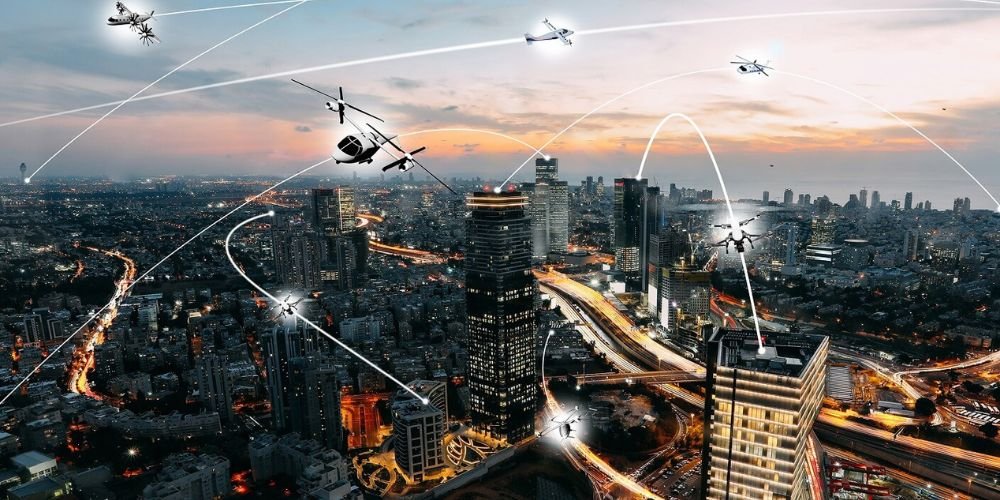The Future of Drones is shaping a new era by revolutionizing communities through aerial imaging. Drones, also referred to as Unmanned Aerial Vehicles or UAVs, have undergone a significant evolution. Once confined to military applications, these versatile machines now play crucial roles across various industries and have even become a staple in recreational activities. As we look ahead, the future of drones holds tremendous promise and potential, shaping the way we live, work, and interact with the world around us.
Revolutionizing Urban Mobility with Drone Taxis

One of the key areas where drones are poised to make a significant impact is in the realm of transportation. The concept of drone taxis is gaining traction, with companies exploring the possibility of airborne vehicles for urban commuting. These Vertical Takeoff and Landing (VTOL) drones promise to alleviate traffic congestion, reduce travel times, and provide a more efficient mode of transportation. Imagine a skyline dotted with drones shuttling people from one point to another, revolutionizing urban mobility.
Drone Delivery Services in Future: Transforming Last-Mile Logistics

In the delivery sector, drones are already making strides. Companies like Amazon are testing drone delivery services, aiming to streamline and expedite the shipping process. This could revolutionize last-mile delivery, particularly in remote or hard-to-reach areas. Drones can navigate through diverse terrains, delivering packages faster and with reduced environmental impact compared to traditional delivery methods.
Precision Agriculture: Optimizing Crop Management with Drones

Agriculture is another sector where the future of drones holds great promise. Precision agriculture, enabled by drones equipped with various sensors and imaging technologies, allows farmers to monitor crops, assess soil health, and optimize irrigation. Drones can cover large agricultural fields efficiently, providing valuable data that empowers farmers to make informed decisions, enhance crop yields, and reduce resource usage.
Search and Rescue Excellence: Drones in Critical Operations

Search and rescue operations are becoming more effective with the integration of drones. Equipped with thermal imaging cameras and other sensors, drones can navigate challenging environments to locate missing persons or assess disaster-stricken areas. Their ability to reach inaccessible or hazardous locations quickly makes them invaluable tools for first responders, potentially saving lives in critical situations.
Environmental Monitoring: Drones in Ecosystem Research

Environmental monitoring is yet another domain where drones are making a positive impact. Scientists use drones to study ecosystems, monitor wildlife, and assess environmental changes. This allows for more comprehensive data collection, leading to better insights into climate change, deforestation, and biodiversity. Drones contribute to our understanding of the planet and support conservation efforts by providing real-time information on environmental trends.
Swarming Technology: Collaborative Drone Capabilities

As technology advances, the capabilities of drones continue to expand. The development of swarming technology enables multiple drones to work together collaboratively. This has applications in various fields, from agriculture, where swarms of drones can cover large areas simultaneously, to surveillance and security, where coordinated efforts can enhance monitoring and response capabilities.
Ethical Considerations in Drone Technology
However, the future of drones also raises ethical and regulatory considerations. Privacy concerns regarding aerial surveillance, data security, and the potential misuse of drone technology need careful attention. Governments and regulatory bodies are working to establish guidelines and regulations to ensure the responsible and safe use of drones. Striking the right balance between innovation and accountability will be crucial in shaping the ethical landscape of drone technology.
Shaping the Future with Drone: Challenges and Opportunities
In conclusion, the future of drones is undeniably exciting, with vast potential to transform industries and improve various aspects of our lives. From revolutionizing transportation and delivery services to enhancing agriculture, search and rescue operations, and environmental monitoring, drones are poised to become integral to our daily experiences. However, as we embrace the possibilities, it is essential to address ethical considerations and establish robust regulatory frameworks to ensure the responsible and beneficial integration of drones into our societies. The journey into the future of drones holds both challenges and opportunities, and how we navigate this evolving landscape will shape the impact of this transformative technology on our world.

